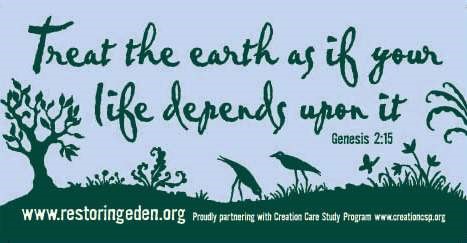
…And Learning to Do Theology from the ‘Ground Up’
One of the things I have noticed living overseas for many years (as a U.S. national) is how (we) Americans have a penchant for putting our dearest beliefs on bumpers stickers. It seems that theological beliefs are no exception to this rule–as far as I can tell, bumper sticker theology is on the rise. Here’s a popular one: “In case of rapture, this vehicle will remained unmanned.” A less popular bumper sticker – “Jesus is coming, plant a tree!” – expresses a very different (and I would suggest, more compelling) vision of the ‘end-times.’
Recently a friend who directs a creation care NGO in the USA gave me a bumper sticker that I display shamelessly on my laptop. It reads:
“Treat the earth as if your life depends upon it – Gen. 2:15”
There are at least three reasons that I decided to turn that bumper sticker into a laptop sticker. First, it expresses the theological impact of Genesis 2:15–the inextricable connection between humanity and soil, expressed originally through a play on words between adam (literally, the “earth creature”) and adamah (the fertile soil from which God created adam). Second, I display it because it so concisely paraphrases the first biblical ‘job description’ given to humans–namely, to serve and observe adamah (Gen. 2:15). Third, I want to have a daily reminder that caring directly for adamah is a way of connecting deeply with creation and aligning my actions with the promise “See, I am making all things new” (Rev. 21:5).
I am aware that at gathering such as the forthcoming ‘Nature in the Balance’ conference (https://formission.org.uk/list/nature-in-the-balance-jri-conference/), which promotes integration of mission spirituality, ecological care, and theological reflection–my brief commentary on the laptop sticker might come across as a supreme example of ‘preaching to the converted.’ But I wonder how many of those who will gather on the 18th March come from or operate in ecclesial and social contexts similar to the one in which I grew up. You see, I was shaped to be neither a Bible-bashing fundamentalist with a bumper sticker about the rapture, nor was I shaped to fit in easily with my tree-hugging, nature-loving university friends whose bumper sticker ‘theologies’ advocated saving the planet by “practicing random acts of kindness.” Intuitively, I knew there had to be more to following Jesus than either ‘not getting left behind’ or merely acting in a kind, random way.
I had a long way to go, however, to connect “treat[ing] the earth as if your life depends upon it” as an expression of my decision to “accept Jesus as my personal Lord and Savior.” Or, to put it in posher theological terms: my beliefs about Christ (Christology) were divorced from an ecologically-informed discipleship to Christ. What healed that ‘divorce’ was connecting my practice of serving and observing adamah (by cultivating soil fertility) with the truth that “all things [in creation] hold together in Christ” (Col. 1:17).
By way of analogy: we all know that there is a big difference between understanding the force of gravity (theoretical knowledge) and knowing how to ride a bicycle (practical knowledge). That practical knowledge does not come to us through understanding physics, but precisely through the activity of riding the bicycle. This raises an interesting issue about the relationship between practical and theoretical knowledge for Christians and others who have an interest in nature conservation and the environment:
What if caring for creation is more like learning to ride a bicycle than it is like studying the laws of physics? What practical knowledge for conservation and environmental care comes to us precisely through our practical care for creation, as we learn to do theology from the ‘ground up’?
Dr Sam Ewell
MA Tutor at ForMission College

